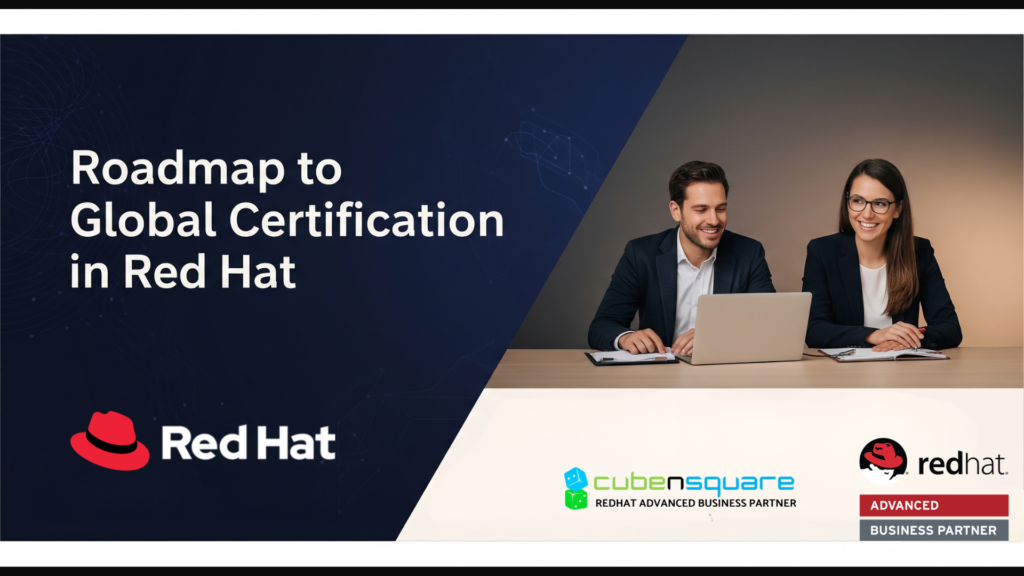Roadmap to Global Certification in Red Hat – Your Guide to Becoming a Certified Red Hat Professional
In the fast-evolving world of Linux and open-source technologies, Red Hat certifications stand out as a gold standard for validating your expertise. Whether you’re an aspiring system administrator, cloud engineer, or DevOps professional, Red Hat provides a structured path to help you advance in your career. In this blog, we’ll explore the Red Hat certification roadmap, the skills you need, and how to prepare for success in the global certification landscape.
Why Red Hat Certification?
Red Hat is the world’s leading provider of enterprise open-source solutions. Organizations globally use Red Hat Enterprise Linux (RHEL), OpenShift, Ansible, and other Red Hat tools for stability, security, and scalability
Red Hat Certification Track
1. Training
The foundational stage where learners get access to structured content.
What’s Included:
o Dedicated lab setup to practice real-world tasks
o Ebook covering theoretical and practical knowledge
o Guided exercises for hands-on learning
2. Choose a Learning Mode:
After the initial training setup, learners can choose either of the two tracks:
- Instructor-Led Training
Description: Live sessions conducted by Red Hat certified trainers
Advantages:
o Real-time interaction
o Doubt clearing with experts
o Structured class timing - Self-Paced Learning
Description: Pre-recorded videos taught by Red Hat professionals
What’s Included:
o Access to video modules
o Ebook and lab access, just like instructor-led
o Flexibility to learn at your own pace
3. Certification
Final Step: After completing training (via either method), you proceed to certification.
Includes:
o Exam coupon (valid for 1 year)
o One free attempt for the certification exam
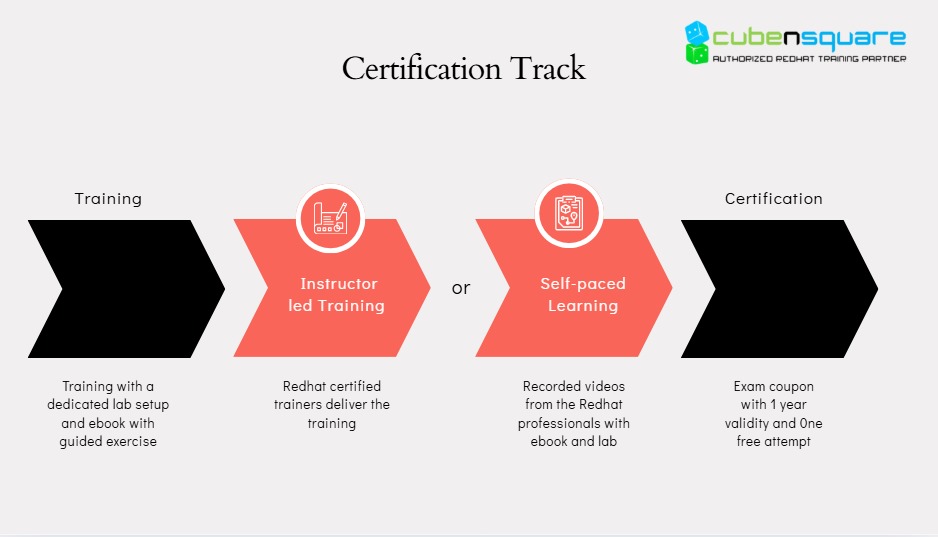
Administrator New to Linux – RHCSA Certification Path
This track is for beginners with little or no experience in Linux, and it outlines a structured journey from basic system administration skills to Red Hat certification
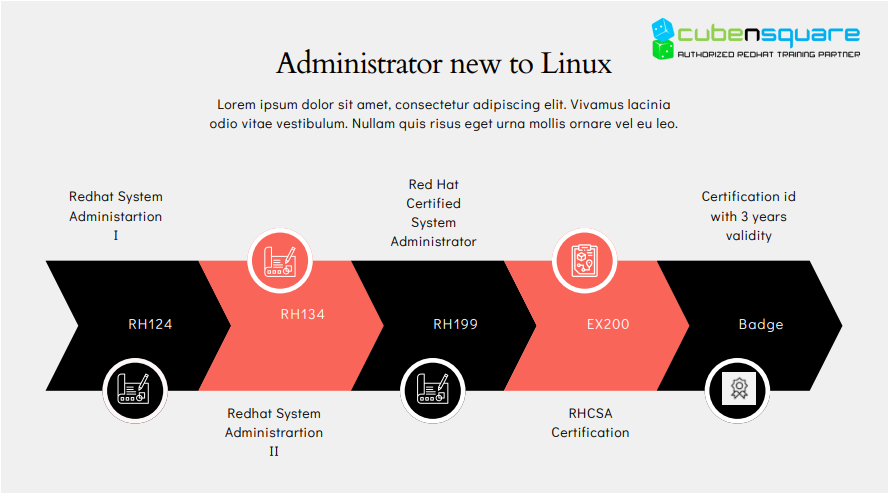
1. Red Hat System Administration I (RH124)
Target Audience: Complete beginners
Focus: Introduction to Linux commands, shell usage, basic file management, and system navigation.
Goal: Build foundational knowledge of Red Hat Enterprise Linux.
2. Red Hat System Administration II (RH134)
Prerequisite: RH124
Focus: Intermediate skills like user management, security, process control, and service configuration.
Goal: Prepare learners to manage RHEL systems in real-world scenarios.
3. Red Hat System Administration III (RH199) (Optional but Recommended)
Audience: Those seeking additional preparation before certification
- Focus: Covers advanced topics and reinforces hands-on skills.
- Installing and configuring RHEL
- Managing users, permissions, and software
- Working with firewalls and storage
- Writing shell scripts
Tip: This is often bundled as a RHCSA Rapid Track course for those with some prior
experience.
4. Red Hat certified System Administrator (EX200) RHCSA Certification
Type: Performance-based exam – 3 hours’ exam
Exam coupon valid for 1 year and one free attempt
Senior/Experienced Linux Administrator – RHCE Certification Path
This track is designed for professionals who already have some hands-on Linux experience and want to move into advanced system administration and automation roles
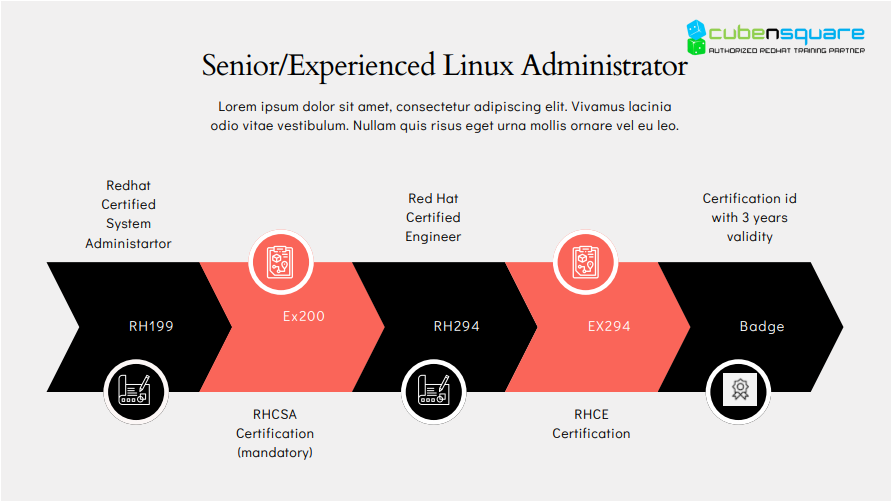
1. RH199 – Red Hat Certified System Administrator (Rapid Track)
Audience: Professionals who already know basic Linux
Purpose: Combines RH124 + RH134 into a fast-paced, intensive course
Goal: Prepares you for RHCSA quickly
2. EX200 – RHCSA Certification (Mandatory)
Type: Performance-based exam
Topics: File systems, users, SELinux, storage, network services
Pre-requisite: Must pass to move to RHCE
3. RH294 – Red Hat System Admin III (Focus: Ansible Automation)
Focus:
- Teaches how to automate tasks using Red Hat Ansible Automation
- Automating tasks using Red Hat Ansible Automation
- Managing large infrastructure with playbooks
- Implementing advanced Linux networking and services
Goal: Manage complex environments through code (Infrastructure as Code)
4. EX294 – RHCE Certification
Type: Practical hands-on exam
Focus: Automating Linux system administration using Ansible
Outcome: You become a Red Hat Certified Engineer (RHCE)
5. Digital Badge & Certification ID
Validity: 3 years
Recognition: Globally accepted digital credential showing your expertise in Linux automation
Choose a Specialization Path
After RHCE or equivalent experience, you can choose to specialize in one or more of the following tracks based on your career interest:
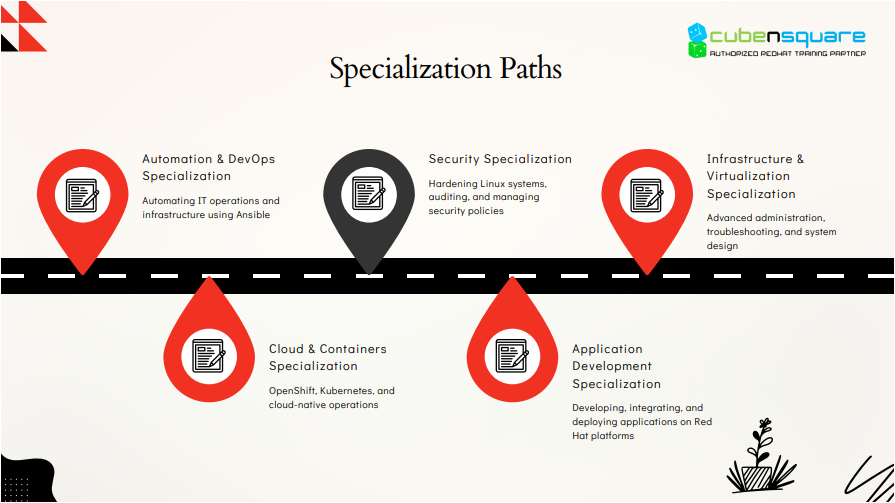
1. Automation & DevOps Specialization
Focus: Automating IT operations and infrastructure using Ansible
Ideal for: DevOps Engineers, Automation Architects
Key Certification:
- Red Hat Certified Specialist in Ansible Automation (EX407)
- Red Hat Certified Specialist in Advanced Automation
2. Security Specialization
Focus: Hardening Linux systems, Managing security policies, auditing, and SELinux
Ideal for: Security Engineers, Compliance Officers
Key Certification: Red Hat Certified Specialist in Security: Linux (EX415)
3. Cloud & Containers Specialization
Focus: OpenShift, Kubernetes, and cloud-native deployments
Ideal for: Cloud Engineers, Platform Engineers
Key Certification:
o Red Hat Certified Specialist in OpenShift Administration (EX280)
o OpenShift Developer or Site Reliability Engineering (SRE) badges
4. Infrastructure & Virtualization Specialization
Focus: Advanced system design, troubleshooting, and virtualization
Ideal for: System Architects, Infrastructure Admins
Key Certification: Red Hat Certified Specialist in Virtualization (EX318)
5. Application Development Specialization
Focus: Developing, integrating, and deploying applications on Red Hat platforms
Ideal for: Java Developers, Integration Architects
Key Certification:
o Red Hat Certified Specialist in Application Development
o Red Hat Certified Specialist in Integration
Path to RHCA – Red Hat Certified Architect
The Red Hat Certified Architect (RHCA) is the highest level of certification offered by Red Hat. It is designed for experienced IT professionals who want to master multiple Red Hat technologies and prove their ability to architect and manage complex enterprise
systems. To earn RHCA, you must complete RHCE + 5 specialist certifications.
There are two tracks:
RHCA in Infrastructure
RHCA in Enterprise Applications
This level demonstrates your mastery and makes you a go-to expert in your organization
RHCA at a Glance
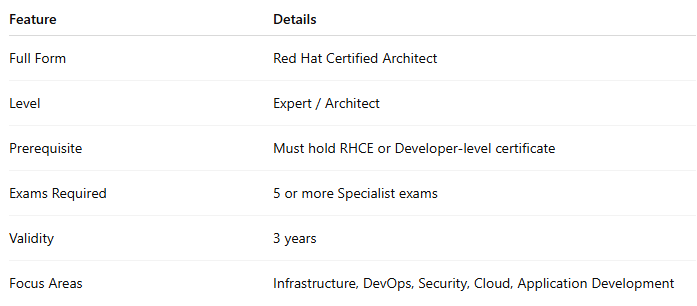
RHCA Certification Path
1. Start with a Prerequisite
You must first become either:
o RHCE (Red Hat Certified Engineer)
or
o A Red Hat Certified Specialist in Application Development
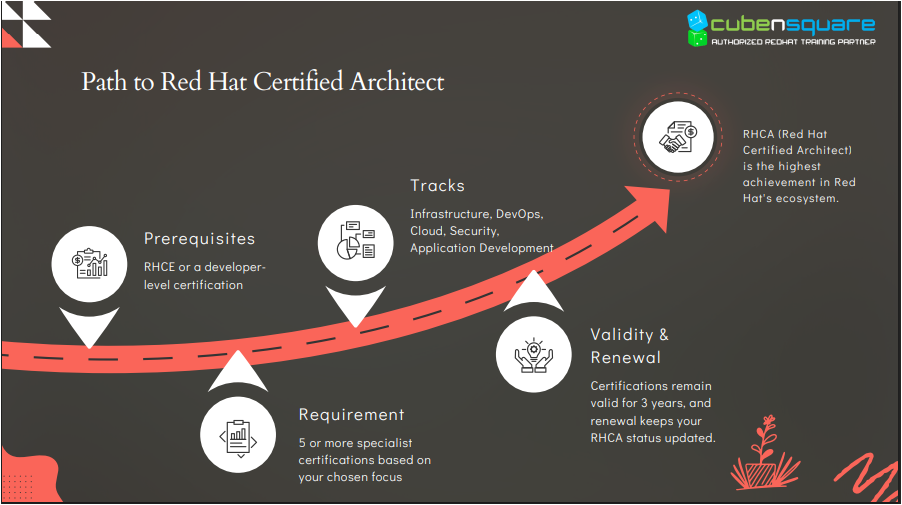
2. Choose Your RHCA Track
Red Hat offers flexibility. You can build your RHCA in one of the following focus areas or combine multiple:
RHCA in Infrastructure
Focus: Advanced Linux administration, clustering, satellite server, virtualization
RHCA in Cloud
Focus: OpenShift, Kubernetes, hybrid cloud management
RHCA in DevOps
Focus: Automation with Ansible, CI/CD pipelines
RHCA in Security
Focus: Linux hardening, SELinux, system auditing
RHCA in Application Development
Focus: Middleware, APIs, microservices, Red Hat Integration tools
3. Pass 5 or More Specialist Exams
Choose five exams aligned to your track. Each exam is a performance-based test, meaning you must perform real-world tasks.
Examples of Specialist Exams:
EX280: OpenShift Administration
EX407: Ansible Automation
EX415: Security: Linux Hardening
EX318: Virtualization
EX283: OpenShift for Developers
EX403: Satellite Server
You can mix and match these based on your goals.
4. Validity and Renewal
Your RHCA status lasts 3 years
To renew, just keep the underlying certifications active
You can also add more Specialist exams to strengthen or expand your RHCA credentials
Why RHCA Matters
- Expert Status: Shows that you’re a master of multiple Red Hat technologies.
- Real-World Proof: All Red Hat exams are hands-on.
- Global Value: Recognized by employers worldwide.
- Career Boost: Ideal for Architect, DevOps Lead, Cloud Consultant, and Technical
Director roles
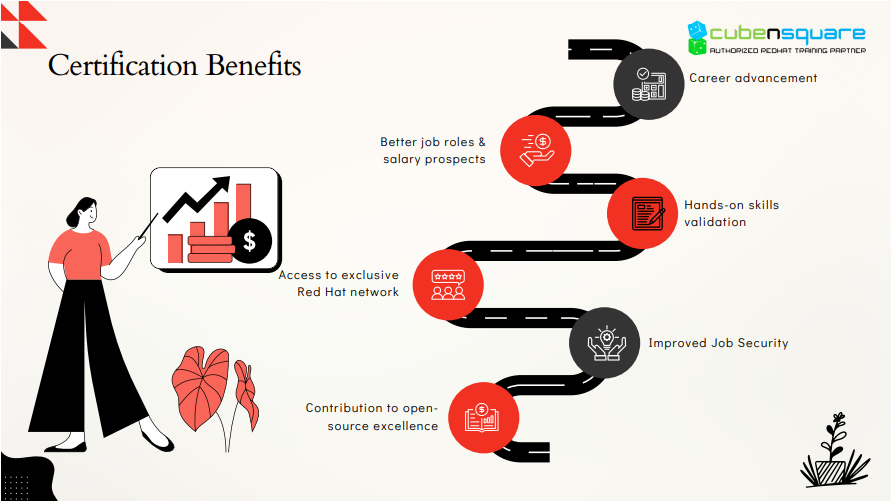
Global Recognition & Career Impact
Red Hat certifications are vendor-neutral, hands-on, and designed for real-world scenarios. Earning a Red Hat certification can lead to roles like:
Linux System Administrator
DevOps Engineer
Cloud Platform Engineer
Site Reliability Engineer (SRE)
Security Specialist
Companies hiring Red Hat-certified professionals: IBM, TCS, Accenture, Capgemini, Red Hat Inc., Amazon, and more.
The path to Red Hat certification is challenging but highly rewarding. With the right mind set, hands-on practice, and official learning resources, you can move from a beginner to an elite Red Hat Certified Architect (RHCA). Remember: the goal is not just to pass an exam but to build real-world skills that make you a better technologist.


